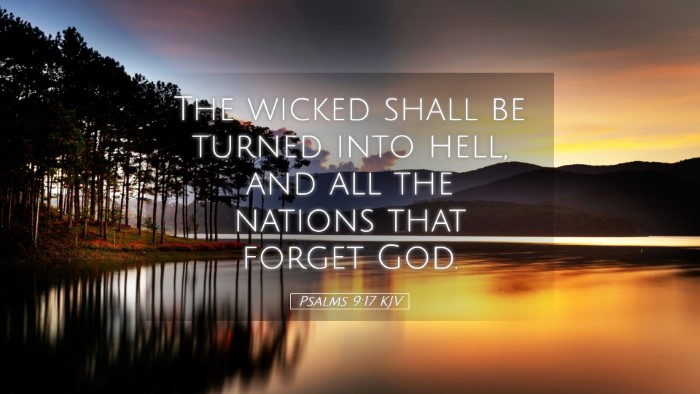Commentary on Psalms 9:17
Verse: Psalms 9:17 - "The wicked shall be turned into hell, and all the nations that forget God."
Introduction
The ninth psalm embodies themes of justice, divine retribution, and the exaltation of God’s name. Within its verses, the tension between the fate of the wicked and the righteous is poignantly highlighted. This commentary elaborates on verse 17, where the psalmist articulates the consequences for the wicked and the nations that neglect their relationship with God, drawing insights from esteemed public domain commentaries.
The Wicked Turned to Hell
Matthew Henry's Insights: Matthew Henry emphasizes the certainty of divine justice. He points out that the term "wicked" extends beyond mere wrongdoing to encompass those who actively oppose God. Their fate is unavoidably sealed—“turned into hell”—indicating a complete and irreversible state of separation from God's presence. Henry remarks that this phrase serves as a dire warning that illustrates the ultimate destination for those who continually reject God’s statutes.
Albert Barnes' Commentary: Albert Barnes elaborates that the term "hell" could be understood as the grave or a place of punishment, urging readers to recognize it as a state of moral and spiritual ruin. He asserts that the imagery serves to reinforce the idea that wickedness is not only punished but also met with God’s righteous indignation, suggesting that living in opposition to God leads to ultimate destruction both in this life and the life to come.
Nations That Forget God
Adam Clarke's Perspective: Clarke notes that the phrase “forget God” does not imply a mere lack of memory but rather a willful abandonment of God’s commandments and moral order. The nations that disregard the divine covenant place themselves in peril. Clarke argues that the surrounding context of nations succumbing to idolatry serves as a historical representation of the consequences faced by those who forsake their Creator in favor of human philosophies.
Matthew Henry's Viewpoint: Henry further elucidates that the nations referred to are those who have received prior knowledge of God’s laws yet choose to ignore them. This neglect bears consequences not only for individuals but collectively for communities and nations. In times of need, such nations lose sight of hope and redemption, falling instead into chaos and destruction when they abandon their moral compass provided by God.
Theological Implications
The theological weight of Psalms 9:17 is substantial, particularly concerning eschatological perspectives. The judgment upon the wicked and those nations that forsake God prompts a reflection on the nature of divine justice and mercy. Each of the commentators highlights the tension between God’s patience and the eventual administration of justice, offering insights pertinent to pastors, theologians, and lay students alike.
- Divine Justice: The concept that God will not allow wickedness to persist unpunished is crucial in understanding His character. It stresses that God is not indifferent to moral decay.
- Human Responsibility: There is an inherent call for nations and individuals to recognize and abide by God’s law, suggesting that spiritual forgetfulness carries weighty implications for societal health.
- Hope for Righteousness: Despite the grim fate of the wicked, the psalm suggests an underlying hope found in the assurance of God’s righteous judgment which ultimately leads to the vindication of the righteous.
Practical Applications
The reflections drawn from Psalms 9:17 encourage a multifaceted approach to faith and governance in contemporary society. Pastors are reminded to preach not only of God’s love but also His justice, guiding their congregations towards a deeper understanding of righteousness. The following applications can be considered:
- Call to Rememberance: Conscientiously remind congregations of the gravity of turning away from God, advocating for a steadfast relationship with Him rooted in knowledge and remembrance of His ways.
- Advocacy for Righteousness: Encourage believers to engage in societal issues that reflect God’s justice, understanding that the health of society correlates directly with its relationship with God.
- Moral Discernment: Equip believers with tools for moral discernment to navigate a world increasingly forgetting divine principles, ensuring they stand firm against any encroachments of secularism.
Conclusion
Psalms 9:17 serves as a powerful reminder of the repercussions faced by both individuals and nations that forget God. The combination of insights from Matthew Henry, Albert Barnes, and Adam Clarke sheds light on God's righteous judgment and the importance of maintaining a relationship with the Divine. In a world often marked by moral ambiguity, this verse not only warns of judgment but also beckons humanity towards a path of righteousness, underscoring the weight of our spiritual choices.


